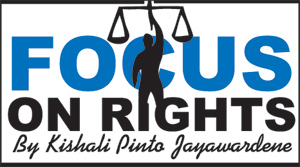Columns
The law is not at fault but the politicians
View(s):In the wake of last month’s communal violence in Sri Lanka’s South-West, the Rajapaksa’s government’s threadbare defence is that existing laws are insufficient to take action against the Bodu Bala Sena (BBS) masquerading as protectors of Buddhism. We see this articulated with increasing if not highly unconvincing force by the Secretary Defence who is President Mahinda Rajapaksa’s brother and others.
 Explanations for state inaction
Explanations for state inaction
Granted, it is futile to engage this government with a critique on the law or the absence thereof. This is a regime which after all, contemptuously pushed the law aside when impeaching a Chief Justice. And action is not taken against the BBS due to palpable lack of government will, not the lack of law.
Several explanations may be offered as to why this is the case. Taken at its worst construction, the BBS is a particularly repulsive genie in a bottle cherished by some (not all in government ranks), wafted out of thin air and then confined until the next outburst occurs. At its best construction, state inaction is due to the fear of antagonising a highly vocal Sinhala-Buddhist radical establishment supported by segments of the Sangha which has now emerged into its unnerving own. In every country, this lunatic fringe establishment exists in one way or another. We see this in the rightwing extremist factions in the United States and anti-minority opinion in India. And let us not even go into the atrocities perpetrated by Islamic fundamentalists throughout the world.
Further, this is not to say that radical Islamic opinion does not exist in Sri Lanka. Whether it is Buddhism, Christianity or Islam, radical sects do exist. They should be appropriately dealt with under the law. Organised religious institutions have been traditionally unable to discipline its errant members. The historic silence of the Catholic Church in regard to proved patterns of child abuse by its clergy is one such example. So while one may bewail the stony silence of the Sangha councils charged with disciplining Buddhist monks, one can scarcely be surprised. These are not failings peculiar to Sri Lanka or Sinhala-Buddhists.
State complicity in dealing with the BBS
But radicalism and religious hierarchies aside, what distinguishes post-war Sri Lanka is the discarding of the law and the apparent state impunity afforded to saffron clothed terror groups when they incite communal hatred. The inaction of the police during the riots, the absence of actual investigations after the violence and this week’s laughably theatrical questioning of the BBS’s Gnanasara Thera all point to this.
This is the element of state complicity which irrefutably marks the Aluthgama and Beruwala violence. Doubtless, this is also what led to those who control affairs in Sri Lanka scrambling in the aftermath to distance themselves from the BBS.
Yet the point is that badly reasoned justifications for government inaction only aggravate the problem. In this sense, one is not merely talking of further negative international opinion or the painting of all Sinhalese as racist barbarians which are inevitable consequences thereof. Considerable distaste and consternation has been expressed by Buddhists themselves who resent the use of the Dhamma for such unholy purposes. This is surely a concern that should preoccupy a regime boasting of the Sinhala-Buddhist vote?
Enough law exists
And from a purely legal perspective, the government’s excuse that it lacks necessary laws can be easily dispensed with. One does not necessarily have to go to the Prevention of Terrorism Act (PTA, 1979) which has been swiftly used against journalist JS Tissainayagam and politician Azath Salley. This draconian weapon of Sri Lanka’s defence establishment should not be cited even against the BBS as a matter of principle. Moreover there is not a slightest chance that it will actually be so employed.
In any event, we already have a ready-made law to tackle religious extremism. The International Covenant on Civil and Political Rights (ICCPR) Act No 56 of 2007 was occasioned by ripples arising as a result of a constitutionally untenable 2007 decision of the Supreme Court (Singarasa case, per Sarath Silva CJ). Here, Sri Lanka’s 1997 accession to a procedure permitting pleas by Sri Lankans to an independent committee of international jurists was declared unconstitutional.
The 1997 accession had been shrewdly spearheaded by then Foreign Minister the late Lakshman Kadirgamar. Its casting aside by the Silva Court essentially led to the integrity of the country’s judicial systems first attracting widespread international attention. These initial ripples coupled with unprecedented failures in political accountability in the conducting of the war in the Wanni in later years led to massive storm waters that are now engulfing the country.
Sending a clear message to those urging accountability
At that time, the ICCPR Act was cosmetically enacted to offset the repercussions of the Singarasa Case. It failed in that purpose and was generally unremarkable in content. However, its Section 3 (1) mandates that ‘no person shall propagate war or advocate national, racial or religious hatred that constitutes incitement to discrimination, hostility or violence.’ Also prohibited is aiding, abetting and even somewhat interestingly, threatening to commit such acts. Expedited trial processes are provided in the High Court.
These laudably broad sections can be used against the BBS. Given the context in which this law was enacted, it would also send a clear message to those urging Sri Lanka’s accountability. At a more pedestrian level, the Penal Code is also available. The public address by Gnanasara Thera calling upon the ‘Marakkalayas’ to be attacked just prior to the communal violence in Aluthgama and Beruwala, falls classically into the prohibited categories. If this is not hate speech, what is?
But laws are used only selectively as the entire period of the post-war Rajapaksa era demonstrates. Its frantic denials of non-association with the BBS therefore remain unacceptable. Mere verbiage and protests that existing law is ineffective only make this worse. At least the sham should be exposed for what it is.

